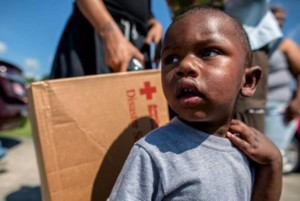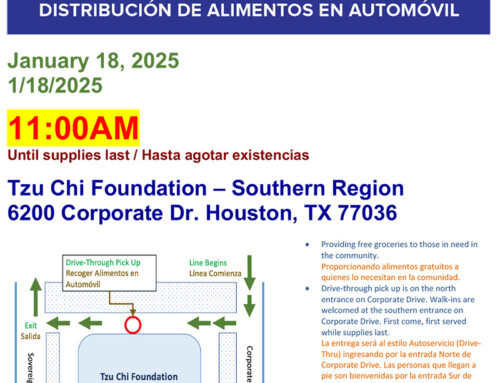
Jacob Hoffpauir meets with Red Cross volunteer Linda Jones from Midwest City, Oklahoma who is part of an integrated response team providing mental health and health services to people affected by the flooding. Photo by: Marko Kokic/American Red Cross
For nearly two weeks, the American Red Cross has been on the ground in Louisiana, helping thousands of people affected by the devastating flooding, a relief effort that could cost at least $30 million. Red Cross workers are providing shelter, food and comfort right now, and will continue to be there in the weeks ahead, helping residents recover from this massive disaster.
As we continue relief efforts in Louisiana, we are also closely watching several storms forming in the Atlantic which could affect the United States over the next several days. And on Wednesday, Red Cross disaster teams in Indiana and Ohio responded to severe weather events, including tornadoes, by setting up overnight shelters and communicating with local emergency officials to coordinate response efforts. In the West, Red Cross workers are also monitoring wildfire activity, and providing shelter and relief resources within impacted and at-risk communities.
Louisiana Flooding: Disaster Update and Red Cross Response
The American Red Cross has mounted a massive relief operation to aid thousands of Louisianans impacted by devastating flooding. To date, more than 2,500 Red Cross volunteers and staff have tirelessly supported relief efforts, and our work is just beginning. On Wednesday night, some 2,400 Louisianans found a safe place to stay in 17 Red Cross and community shelters outside of flood ravaged areas. Many of these residents have now been living within shelters for two weeks, since their homes were either severely damaged or completely destroyed due to the floodwaters.
Within shelters, residents can access meals, relief supplies and information. Red Cross volunteers are also providing emotional support to help people cope. Floodwaters continue to recede, and each day, the Red Cross is able to get into more and more neighborhoods. Where possible, the Red Cross is distributing food and relief supplies, such as personal hygiene items, insect repellant, cleaning kits and bleach, to people at their homes. Disaster mental health and health services volunteers are providing emotional support and helping to replace things like lost eyeglasses, wheelchairs and medications. More than 90 response vehicles are fanning through affected neighborhoods.
Since the flooding began, together with local, state and national partners, the Red Cross has:
- Provided more than 50,200 overnight shelter stays;
- Distributed more than 151,500 relief items;
- Served more than 405,600 meals and snacks; and
- Handled more than 22,000 calls from people seeking information and help.

Kadeem, 1, of Iberia Parish, Louisiana visits a Red Cross flood recovery supply distribution center. Photo by: Marko Kokic/American Red Cross
Large disasters like this flooding create more needs than any one organization can meet, and the Red Cross is working closely with the entire response community – federal, state, county and local agencies, other nonprofit organizations, churches, area businesses and others – to coordinate relief efforts and deliver help quickly and efficiently, keeping in mind the diverse needs of the community. Some of these partners include Southern Baptist Disaster Relief, the NAACP, Islamic Relief USA, Church of the Brethren Children’s Disaster Services, AmeriCorps National Civilian Community Corps, Verizon, Church of Jesus Christ of Latter-day Saints, Americares, Jet Blue, Operation HOPE, Legal Services Corporation among others. The Red Cross will continue working closely with partners in the days ahead to ensure people receive the help they need as quickly as possible.
Early estimates predict the massive Red Cross relief effort in Louisiana could cost at least $30 million – and we haven’t raised nearly enough in donations to cover this cost. This cost estimate may grow as we learn more about the scope and magnitude of the devastation. It includes the costs of providing food, shelter, blankets, cots, emotional support, health services, initial casework and relief supplies. It also includes some of the less visible costs that make relief possible including logistics, staff and technology expenses. As of Aug. 24, the Red Cross has received approximately $10.6 million in designated donations and pledges to support Louisiana. Designated donations are the first dollars used to support Red Cross response efforts. If costs exceed designated donations, then Disaster Relief funds will be used to cover the difference.
Louisiana’s devastating flooding has uprooted lives, destroyed homes and left thousands with nothing but the few items they were able to escape with. The Red Cross will remain in impacted communities in the weeks and months to come to provide help and the resources residents need to return to a sense of normalcy.






Leave A Comment